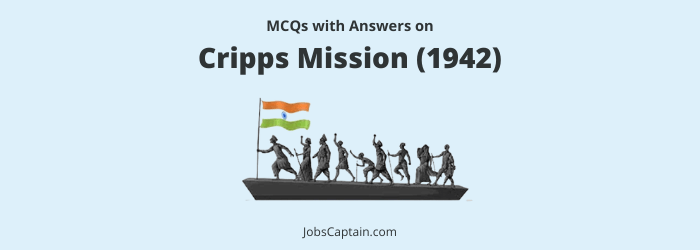
Question 1. An important aspect of the Cripps Mission of 1942 was ________.
(A) the framing of a Constitution for the entire Indian Union, with no separate constitution for any province and a Union Constitution to be accepted by all provinces
(B) the active participation and co-operation of the Indian People, communities and political parties in the British war efforts as a condition for granting Independence with full Sovereign status to India after the war
(C) the creation of an Indian Union with Dominion status will be soon after the Second World War
(D) that all Indian States should join the Indian Union as a condition to consider any degree of autonomy for India
Question 2. Which one of the following is not true about the Cripps Mission?
(A) Any province could remain outside the Indian Union
(B) The formation of new executive Council with equal representation for both Hindus & Muslims
(C)Acceptance of the Constitution framed by Constituent Assembly
(D) Dominion status at the end of the war
Question 3. In which year did the Cripps Mission come to India?
(A) 1946
(B) 1944
(C) 1942
(D) 1940
Question 4. The plan of Sir Stafford Cripps envisaged that after the Second World War _________.
(A) India should be given Dominion status
(B) India should be made a republic with the condition that she will join the Commonwealth
(C) India should be partitioned into two before granting independence
(D) India should be granted complete independence
Question 5. Who viewed the Cripps proposal as a post-dated cheque upon a crashing bank?
(A) Jai Prakash Narayan
(B) J.B. Kriplani
(C) Jawaharlal Nehru
(D) Mahatma Gandhi
Question 6. Who of the following Prime Ministers sent Cripps Mission to India?
(A) Winston Churchill
(B) Neville Chamberlain
(C) Stanley Baldwin
(D) James Ramsay MacDonald
Question 7. Who among the following were official Congress negotiators with Cripps Mission?
(A) Rajendra Prasad and Rafi Ahmad Kidwai
(B) Pandit Jawaharlal Nehru and Maulana Azad
(C) Acharya J.B. Kriplani and C. Rajagopalachari
(D) Mahatma Gandhi and Sardar Patel
Question 8. Who among the following called the Movements of Gandhiji as ‘Political Blackmail’?
(A) Lord Montague
(B) Lord Linlithgow
(C) Lord Wavell
(D) Lord Chelmsford
Question 9. Sir Stafford Cripps came to India with a draft declaration of proposals of British Government included that
- India should be given dominion status.
- All provinces and States must be merged to make the Indian Union.
- Any province or State can take the decision to live outside of the Indian Union.
- Indian Constitution must be constituted by the people of India.
Choose the correct answer from the code given below.
(A) 1, 2 and 3
(B) 1, 2 and 4
(C) 2, 3 and 4
(D) All of these
Question 10. Consider the following statements. The ‘Cripps’ proposals include the provision for
- Full independence for India.
- Creation of Constitution making body.
Which of the statement(s) given above is/are correct?
(A) Neither 1 nor 2
(B) Both 1 and 2
(C) Only 2
(D) Only 1
